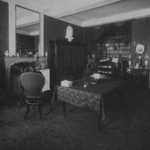Voorbeeld en voorganger. Robert Fruin en Godefroid Kurth als vaders van de geschiedwetenschap
DOI:
https://doi.org/10.18352/bmgn-lchr.7218Keywords:
History (historiography)Abstract
Model and Predecessor: Robert Fruin and Godefroid Kurth as Fathers of Historical ScholarshipThis article explores not how historians study collective memories, but how they create and nourish (professional) memory cultures of their own. It examines how historians commemorate their predecessors and celebrate their historiographical achievements. The case studies chosen are Robert Fruin (1823-1899) and Godefroid Kurth (1847-1916), both of whom were hailed as ‘father of history’ by Dutch and Belgian admirers, respectively, in the late nineteenth century. Tracing the fortunes of Fruin’s and Kurth’s reputations throughout the twentieth century, the article shows that this ‘father of history’ metaphor acquired rather diverse meanings. These shifting meanings not only mirrored changing ideals of scholarly practice, but also reflected institutional concerns, religious or ideological partisanship, and growing concerns over the habit of conceiving of historical scholarship in national terms. Finally, the article recommends further research on the affective and emotional dimensions of fatherhood in nineteenth and twentieth-century historiography.
Downloads

Downloads
Published
Issue
Section
License
Authors who publish with this journal agree to the following terms:
a) Authors retain copyright and grant the journal right of first publication with the work simultaneously licensed under a Creative Commons Attribution 4.0 International (CC BY 4.0) that allows others to share the work with an acknowledgement of the work's authorship and initial publication in this journal.
b) Authors are able to enter into separate, additional contractual arrangements for the non-exclusive distribution of the journal's published version of the work (e.g., post it to an institutional repository or publish it in a book), with an acknowledgement of its initial publication in this journal.
c) Authors are permitted to post their work online (e.g., in institutional repositories or on their website) prior to and during the submission process.
Authors are explicitly encouraged to deposit their published article in their institutional repository.








